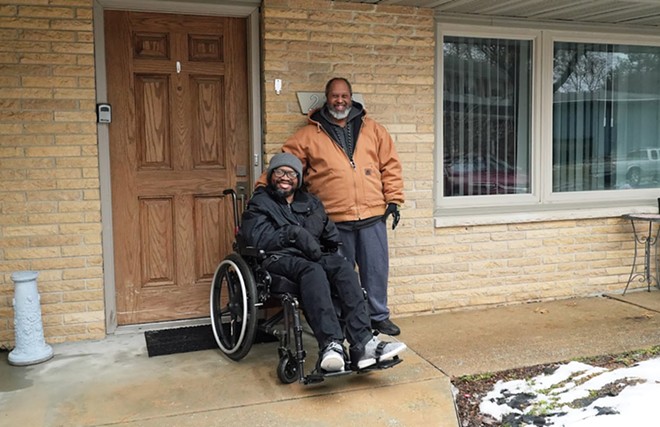
The seven-year-old court case that determined Springfield illegally discriminated against people with disabilities through residential zoning is approaching a conclusion.
The late U.S District Court judge Richard Mills ruled in March 2020 that the city violated the federal Fair Housing Act through a spacing ordinance prohibiting two homes for people with disabilities from operating within 600 feet of each other.
A federal jury in July 2022 then decided the city should pay a total of $293,000 in damages for the violation. Included was $162,000 in compensatory damages to the three adult male residents of the home that led to the lawsuit, on Noble Avenue near Washington Park, and to their guardians.
The jury also awarded $131,000 in compensatory damages to Individual Advocacy Group, a Romeoville-based nonprofit that was providing services to the men in the Community Integrated Living Arrangement home, or CILA, that they began renting in 2014.
IAG contended it didn't know there was another group home nearby and that it deserved a waiver from the zoning requirement.
IAG and Sangamon County resident Mary Valencia, sister and guardian of one of the original three residents, Alan Dennis, who died in 2017 of natural causes at age 62, first filed the civil lawsuit in December 2016.
The lawsuit prevented the three men from being forced to leave the home after the Springfield Zoning and Planning Commission and the City Council in November 2016 voted to deny a conditional permitted use application that would have granted an exception from the spacing requirement.
Mills issued a preliminary injunction in 2017 that prevented the city from kicking the men out of the home while the case proceeded.
After the 2022 jury decision, payment of damages remained pending while a different U.S. District Court judge, Sara Darrow, considered a civil penalty against the city requested by the Office of the U.S. Attorney for the Central District of Illinois. Federal prosecutors joined the case as a plaintiff in 2017.
Darrow on Dec. 7 ordered the city to pay a civil penalty of $61,982 to the federal government. The judge also ordered that the city pay IAG $53,654 in "prejudgment interest."
The U.S. Attorney's Office said this was one of the largest civil penalties that the U.S. Department of Justice has obtained against a municipality in Illinois for violations of the FHA.
Remaining is the issue of attorney fees, with IAG wanting the city to pay the agency's legal costs and the city contending that some of the attorneys charged rates that were too high and unjustified.
Rulings on the merits of the case and damages took place during the administration of former mayor Jim Langfelder, when the city's corporation counsel was Jim Zerkle. Zerkle never filed an appeal.
The current corporation counsel, Gregory Moredock, who is part of new Mayor Misty Buscher's cabinet, said he doesn't think the city will appeal Mills' ruling or the jury's award of damages to the individuals. He said he will recommend that the City Council amend the spacing ordinance.
However, Moredock told Illinois Times on Jan. 22 that some issues still need to be decided before the city pays damages, the civil penalty and interest.
"We have until a final order – after attorney fees are resolved – to decide whether to appeal any or all aspects of the case," he said. "A final decision on whether and what we will appeal has not been made as of this date."
When issuing the civil penalty, Darrow noted that the city argued the spacing rule "was adopted to protect group homes from being segregated into a single neighborhood" and that the spacing rule was enacted by city officials in 1990 "in a good faith effort to comply with the requirements of the FHA."
However, Darrow faulted the city for not updating the ordinance after a 2002 federal court ruling said such a spacing requirement would be discriminatory.
"Ignorance of the law is no excuse," the judge wrote in her December ruling, adding that the "case law interpreting the FHA's disability provisions had sufficiently developed by 2016 to find blameworthy the enforcement of this ... discriminatory spacing rule."
Darrow said the city's zoning ordinance made it more difficult for people with disabilities to transition from institutions to residential living situations in the community. That right was guaranteed by the 1999 U.S. Supreme Court decision in Olmstead vs. L.C., she said.
Darrow said the civil penalty against Springfield will "make clear to municipalities that these facially discriminatory spacing rules may not be used to hinder the trend of shifting persons with disabilities from institutions to community-based residences."
Assistant Attorney General Kristen Clarke of the Justice Department's Civil Rights Division said in a news release that the court's decision "makes clear that there are real consequences to cities and other municipalities when they unlawfully and immorally exclude people with disabilities from residential neighborhoods."
U.S. Attorney Gregory Harris of the Central District of Illinois said the case resulted in a "groundbreaking civil rights decision." Assistant U.S. Attorney Joshua Grant said: "This case illustrates what can happen when government action erodes a basic human right. A group of individuals almost lost their home."
Darrow permanently enjoined the city from taking any action against the owners or residents of the home and ordered city officials and staff to undergo fair housing training.
Charlene Bennett, chief executive officer of Individual Advocacy Group, said she hopes other municipalities in Illinois that still impose restrictive and potentially illegal zoning on people with disabilities take note of the Springfield case.
"I'm hoping it gets resolved soon," she said. "I'm just so disappointed it's taken this long for justice to occur."
Bennett said it was difficult to hear the prejudices of some neighbors toward people with disabilities aired at public meetings in Springfield in 2016 before IAG decided to file suit.
"It's been a rough struggle," she said.
Dean Olsen is a senior staff writer at Illinois Times. He can be reached at [email protected], 217-679-7810 or twitter.com/DeanOlsenIT.



















